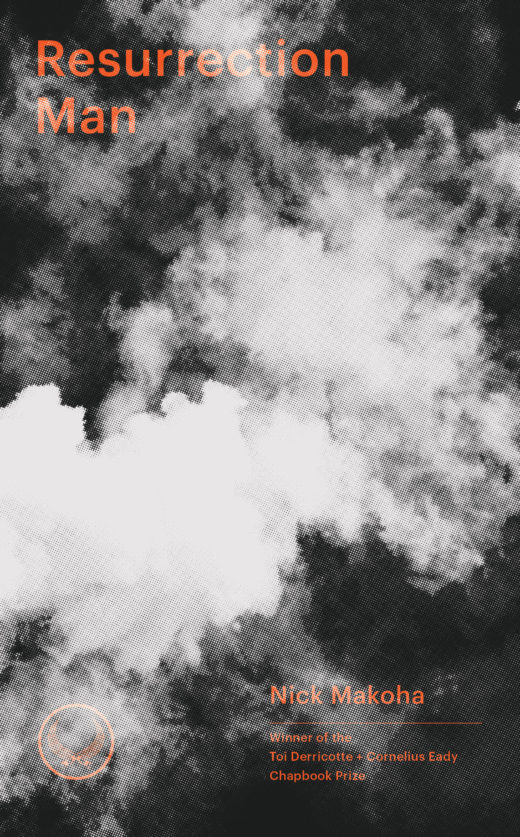- Betty Tompkins: Sex World/WOMEN Words, Phrases, and Stories

- MIRROR STAGES: Brookhart Jonquil in Conversation
Resurrection Man by Nick Makoha
Lizzie Davis

Each poem here is witness to the confluence of systems of belief, of modernity, and timelessness that mark the Ugandan landscape. Tribesman “worship clumps of human hair,” while a power cord is run through the cane field. Potholes are filled with plasticine on one page, and mountains wait to “grow their backs” on the next. Time becomes circular and elastic as old-world prophecies are plowed over with the new; there is the sense that the unthinkable has come to pass already, and that it will come to pass again. The tight contrasts that come when the helicopter blades cease their thundering make space for moments of clarity: “the revelation on a sky’s blank page,” the poet’s “reflection [sitting] in a gazelle’s eye as clouds pass.” Noise is matched here with silence, violence with stillness, and bitterness with a deep appreciation for country, history, and beauty.
It is against this backdrop that Makoha begins his project of cultivating empathy through scale. The roots of war and upheaval are concentrated in brief, intense moments; domestic familiarity and simple language pantomime the greatest of atrocities. These gestures make war tangible for the reader, moving against the generalizations and sweeping statistics that inundate us in the digital news or the swathes of map that flash red on our screens. The start of a city vanishing is just “two men on a bike and a shortage of visas.” Friends at a bar fall out over a girl, and “in place of war they pull off their shirts, lunatics in an embrace,” while in the very next breath, policemen hang out of armed cars with sophisticated weapons. We leave the warmth of the bar, the quarrel of men who could be our cousins or brothers, and feel violence looming.
Perhaps the most searing moments in the collection are those in which Makoha writes on the conflation of violence and faith, condemning the use of religion as a way of legitimizing brutality—the empty Messianic promises, the manipulative appeals to tribal traditions. Upheaval and aggression build their own kind of mythology: the tossing of grenades is a fire ritual; enemies move like “spirits slipping into skin,” and poison has an “animal understanding.” Violence is a ritualized pattern that repeats across the country’s social fabric.
As in any landscape of manipulation and turbulence, children are the youngest and most innocent of the exploited: “clouds not fully formed turning red” who are forced to become pawns in a war they do not understand. In one of the more formally attuned and jarring poems, “Killing Craft,” Makoha creates a singsong, childlike rhyme scheme to deliver the story of a young boy conscripted into the army: “Boy has the same name as me, / from the same clan. Boy killed his father / and buried him in the sand.” Countless other poems address the lost innocence of children implicated in violence, both via the singular son (the poet himself, a child forced into exile) and the plural (the generation of sons awaiting change, the generation of fathers who are no more than “permanent apparitions”). Both must wear the clothes of their forebears, “uniforms / that belonged to someone else.” Both face displacement, a social and political inheritance, and the inheritance of generational trauma.
Each page in Resurrection Man is a potent assertion of presence: Makoha imparts a personal and political history, declares an identity, and calls the reader into consciousness. With their deep wells of grief and indignation, these poems provoke compassion and insist on engagement and understanding. They turn a reader’s gaze to what has remained willfully unseen for decades too long. Works like this one are essential to a poetry of empathy and action. We need them now.
Lizzie Davis is a writer, editor, and literary translator from Spanish and Italian to English. Her translations from the Spanish include works by Ezio Neyra, Pilar Fraile Amador, Daniel Saldaña París, and others, as well as Elena Medel’s My First Bikini (Jai-Alai Books, 2015) and the prose for Then Come Back: The Lost Neruda (Copper Canyon, 2016). She edits works both in their original English and in translation at Coffee House Press.








